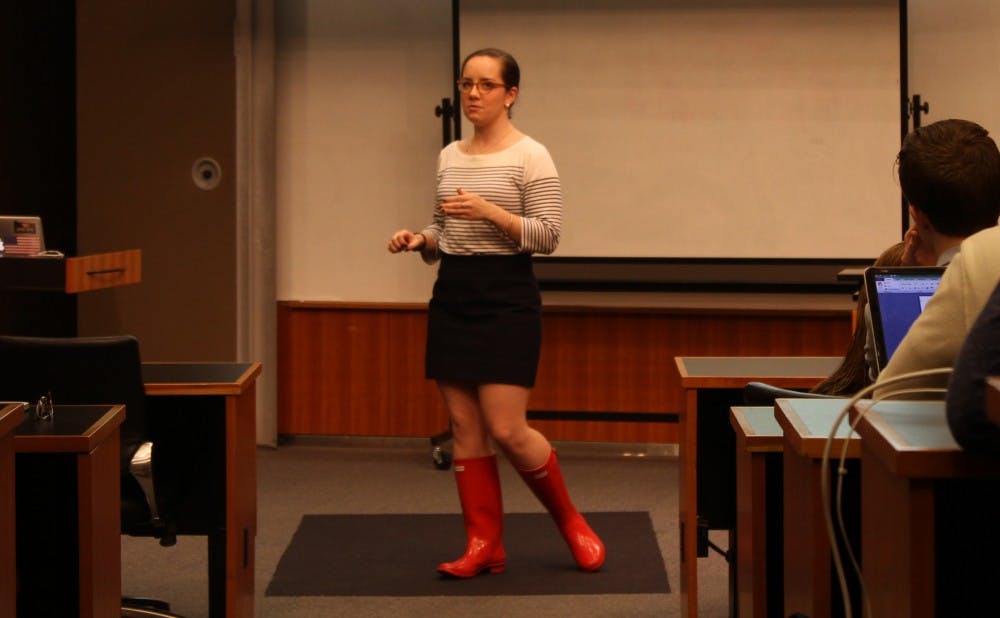Duke Student Government has started the year off with resignations and a "hit on morale."
Seniors Annie Adair and John Guarco resigned from their positions as attorney general and DSG justice, respectively, during the summer. Both Adair and Guarco ran against now-President Tara Bansal, a senior, last year.
Adair said that her becoming Attorney General was “contentious in the first place," and that there were disagreements between herself and other parts of DSG administration.
"I resigned because there was definitely a difference of opinion between me and the administration," she said. "I didn't really think there was a place for me anymore, and so I decided it would be best if I resigned and kind of got out of the way. When it boils down to it, I didn't think that there was any point that I could see it being productive."
Guarco said something similar, noting he left because he had a different view of jurisprudence. Bansal made clear, however, that Adair and Guarco were not ousted, and that Adair was offered another position as director of communications.
“There would be no reason for me to not want them on DSG," Bansal said.
Bansal and Weisman selected sophomore Sabriyya Pate, who did not have a connection with DSG, as a deputy and then as co-attorney general before Adair's resignation. This was done to ensure the attorney general, who oversees elections, would not have a conflict of interest, Bansal said. The attorney general monitors disputes between candidates, and if he or she knew the candidate beforehand in a political context, there could be bias.
“As someone who knows all the candidates well, it’s really difficult to adjudicate because of conflicts of interest," she said.
Pate will now serves as the sole attorney general.
Adair explained that the benefit of her being the attorney general was that she was already well versed in the election rules and practices.
Among other changes, the executive board will have less presence at Senate meetings. Bansal and sophomore Kushal Kadakia—her chief of staff—will not attend the weekly meetings as often or will stay in the meetings for shorter periods of time. This decision was based on a request by Executive Vice President Ilana Weisman, a senior.
Weisman said she emailed Bansal and Kadakia to negotiate decreasing the time they spend in the Senate, and that they eventually reached an “amicable, mutual decision."
“I wanted to move away from executive board dominance,” Weisman said. “Tara and Kushal are incredible people, and they're super passionate about DSG, but they're not members of the Senate. Even though Tara has the right to speak to Senate when she's there, both she and I agree that that should be used with restraint.”
Additionally, there have been internal disagreements concerning the use of parking passes for DSG's executive board. Bansal rescinded the board's access to special parking passes to the Card Lot—which were still paid for by each student—but she retains a universal parking pass, which she pays for herself, Adair said.
“I had 53 projects last year ranging from gender-neutral bathrooms to a cross-cultural competency module before school. The parking pass allowed me to get to class on time,” Weisman said. “Some of my work included meeting leaders of identity groups wherever they possibly could and in pockets of time. For me, the increased access [was helpful].”
Bansal said the parking access was an ongoing conversation. Although Weisman said she understood that the special parking pass access was “a petty inconvenience thing," she added it does impact her ability to do her job.
“I think the biggest hit it has is on morale,” Weisman said.
Correction: This article was updated at 8:30 a.m. Monday to note that Pate was chosen before Adair's resignation. The Chronicle regrets the error.
Get The Chronicle straight to your inbox
Signup for our weekly newsletter. Cancel at any time.
Class of 2019
Editor-in-chief 2017-18,
Local and national news department head 2016-17
Born in Hyderabad, India, Likhitha Butchireddygari moved to Baltimore at a young age. She is pursuing a Program II major entitled "Digital Democracy and Data" about the future of the American democracy.

